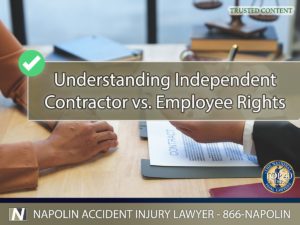Understanding Independent Contractor vs. Employee Rights in California
The classification of workers as independent contractors or employees is a pivotal aspect of California's employment landscape, with significant implications for legal rights, obligations, and protections. This distinction is not merely academic; it determines access to critical benefits such as health insurance, workers' compensation, and unemployment benefits. The evolving nature of the gig economy has further blurred the lines between these classifications, making it essential for workers and employers alike to understand the legal criteria that govern these roles. California's legal framework, particularly following the Dynamex decision, sets stringent standards for classifying workers, underscoring the state's commitment to protecting worker rights. This article delves into the nuances of these classifications, offering clarity and guidance on navigating the complexities of California labor law.

The Legal Distinction Between Independent Contractors and Employees
The Legal Distinction Between Independent Contractors and Employees
In California, the distinction between independent contractors and employees is grounded in the degree of control an employer has over the work performed and the worker's operational independence. Employees typically work under the employer's direct supervision, adhering to scheduled hours and company policies, and are entitled to a range of benefits and protections. In contrast, independent contractors operate their own businesses, retain control over their work schedules, methods, and clients, and are not entitled to employee benefits. The legal ramifications of this distinction are profound, affecting tax obligations, eligibility for benefits, and liability in the event of workplace injuries.
The Significance of Worker Classification in California
Worker classification carries significant legal and financial implications for both parties. For employees, classification determines eligibility for minimum wage, overtime compensation, unemployment insurance, and workers' compensation benefits. Employers, on the other hand, are obligated to pay payroll taxes, provide workers' compensation insurance, and adhere to labor laws for employees, obligations that do not apply to independent contractors. Misclassification can lead to legal disputes, penalties, and back pay awards, highlighting the importance of accurate classification at the outset of any working relationship.
Key Factors Determining Worker Status in California
The determination of worker status in California hinges on several key factors, primarily centered around the degree of control over the work and the worker's independence. The “ABC test,” established by the Dynamex decision, prescribes that a worker is presumed to be an employee unless the hiring entity satisfies three conditions: the worker is free from the control and direction of the hiring entity in connection with the performance of the work, the worker performs work that is outside the usual course of the hiring entity's business, and the worker is customarily engaged in an independently established trade, occupation, or business. This test aims to simplify classification disputes and ensure that workers who are economically dependent on a business receive the full protections of employment.
The Dynamex Decision and Its Implications
The Dynamex Operations West, Inc. v. Superior Court decision marked a significant shift in California labor law, establishing the ABC test for classifying workers. This landmark ruling emerged from a lawsuit in which Dynamex, a delivery company, converted its employees to independent contractors to save costs, sparking legal challenges. The California Supreme Court's decision in Dynamex prioritizes worker protections and sets a high bar for companies seeking to classify workers as independent contractors. The implications of this decision extend across industries, compelling businesses to reevaluate their classification practices and ensuring broader protections for workers.

Rights and Protections for Employees vs. Independent Contractors
Rights and Protections for Employees vs. Independent Contractors
The rights and protections afforded to employees in California are extensive, including minimum wage, overtime pay, rest breaks, unemployment insurance, and workers' compensation. Employees also benefit from protections against discrimination and harassment and have the right to engage in collective bargaining. Independent contractors, while enjoying operational autonomy, do not receive these protections and benefits. They are responsible for their own taxes, health insurance, and retirement savings, and have limited recourse in disputes over payment and working conditions.
Misclassification: Risks, Penalties, and Remedies
Misclassification of workers as independent contractors can lead to significant legal and financial consequences for employers, including penalties, back wages, and damages for failing to provide employee benefits. Workers misclassified as independent contractors can seek legal remedies to recover lost wages and benefits. California's Labor and Workforce Development Agency (LWDA) provides a mechanism for workers to report misclassification, and the state aggressively pursues employers who violate classification laws. Legal recourse for misclassified workers includes filing claims for unpaid wages, overtime, and workers' compensation benefits.
Navigating Misclassification and Protecting Your Rights
Workers who believe they have been misclassified have several avenues for recourse, including filing a complaint with the California Labor Commissioner's Office or pursuing legal action through the courts. It is advisable for workers to document all aspects of their working relationship, including hours worked, duties performed, and communications with the employer, as this information can be crucial in a misclassification dispute. Employers should conduct regular audits of their workforce classifications with the assistance of legal counsel to ensure compliance with California labor laws and avoid potential disputes.

Understanding Independent Contractor vs. Employee Rights in California
Understanding Independent Contractor vs. Employee Rights in California
The classification of workers in California as independent contractors or employees has far-reaching implications for legal rights and protections. Understanding and navigating these distinctions is crucial for both workers and employers to ensure compliance with state labor laws and protect their respective rights and interests. If you are facing challenges related to worker classification or have questions about your rights, Napolin Accident Injury Lawyer is here to provide guidance and support. Contact us at (866)-NAPOLIN for a free consultation to explore your options and ensure your rights are protected.
- Safely and Legally Navigating Parking Lots in California - July 15, 2024
- Navigating the Aftermath of a Highway Auto Accident in California - July 15, 2024
- An Overview of California's Commercial Truck Insurance Laws - July 15, 2024
